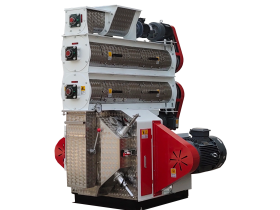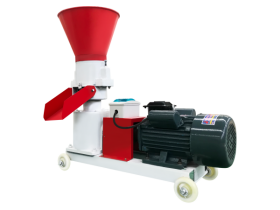Crushing process: The raw materials in the pulverized silo are fed into a pulverizer to be pulverized into powdery raw materials, and then distributed to each batching bin by a conveyor according to the raw material type, and the main equipment is a pulverizer. The purpose of the comminution is to increase the specific surface area of the feed and to improve the utilization of the feed by the animal.
Mixing process: the process of uniformly mixing the ingredients of the batching scale, the core equipment is the mixer. Ultimately affect the feeding effect. Mixing should be controlled well, the uniformity is gradually reached the best uniformity with the increase of mixing time, but after mixing evenly and then prolonging the mixing time, the delamination of raw materials will occur.
Extruder: The duck pellet machine used for production is mainly a single-screw extrusion expander, which can be further divided into a dry extrusion extruder and a humidity extrusion extruder. The extrusion equipment currently used is mostly wet and dry. Using different parameters, the extruder can produce buoyant, sinking, slow feed and semi-wet feed, which can adapt to the feeding requirements of various aquatic animals.
Dryer and Cooling: In the process of extruding, a large amount of heat is generated due to the introduction of high temperature and high humidity steam while the material is squeezed, which makes the temperature and humidity of the extruded particles higher. For adhesion and mildew, the moisture must be reduced to below 14%, and the temperature must be lowered to below 8°C higher than the air temperature. SKLN counterflow cooler is used for cooling.
Screening: After the pellet feed is processed by the pulverization process, some powder clots and other materials that do not meet the requirements will be produced, the crushed pellet feed needs to be sieved into products with uniform granules and uniform size.
Packaging: The process of weighing, bagging and slitting the finished product by automatic packaging equipment. Generally, the finished products are shipped in two forms: bulk and bagged. Due to the restrictions of transportation equipment and large-scale feeding, the bagging method is often adopted. The automatic weighing system can weigh different feeds according to customer needs.


.jpg)






.jpg)


.jpg)





.jpg)



